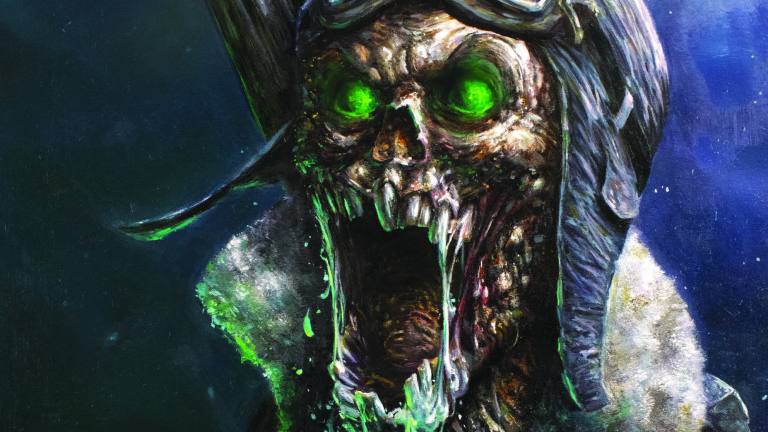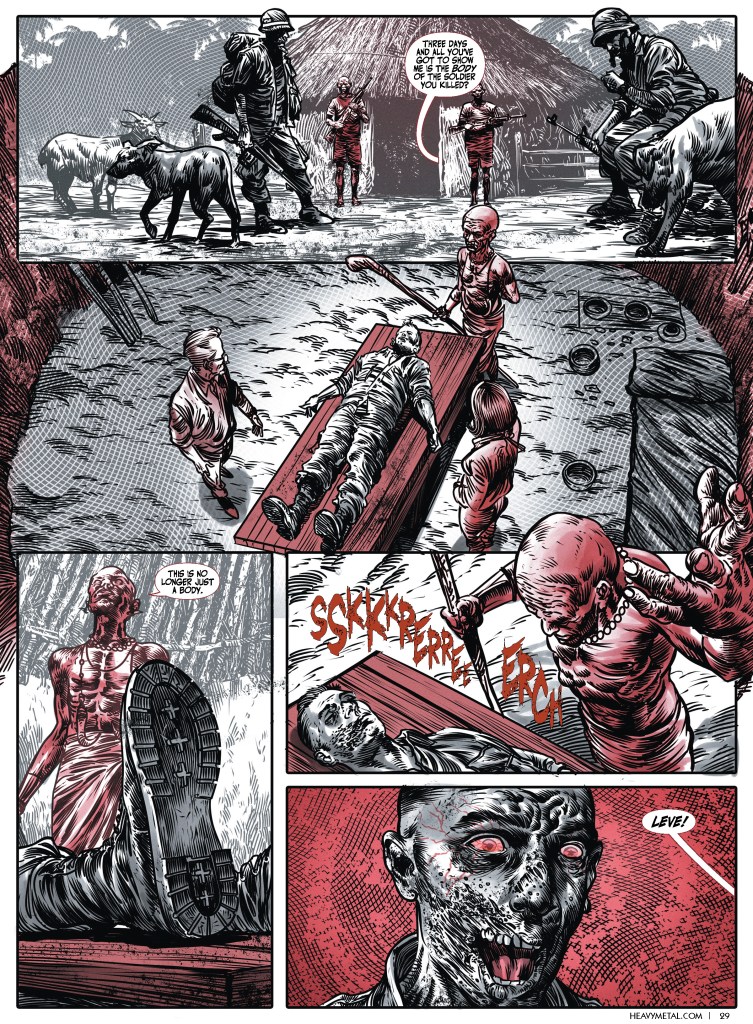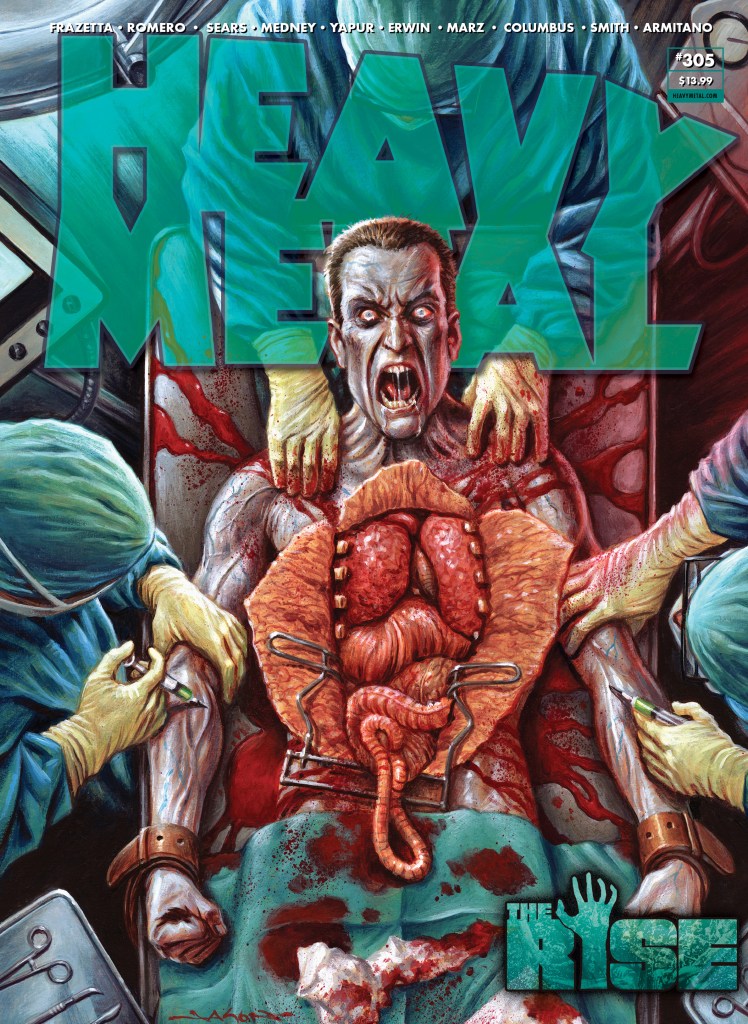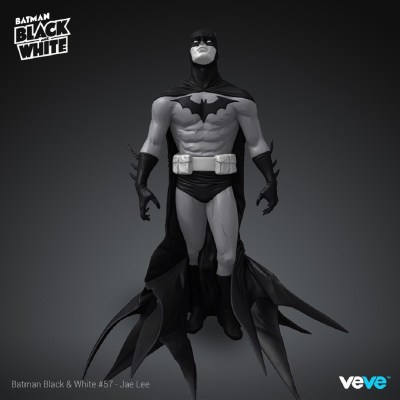How George C. Romero’s Heavy Metal Comics Keep Dad’s Zombie Legacy Alive
George C. Romero is writing two new comic book series that honor the zombie mythology created by his dad, George A. Romero.

The name is Romero. George C. Romero. And in case you didn’t guess, George C. Romero is the son of the late, legendary George A. Romero, the pioneering filmmaker whose 1968 horror classic Night of the Living Dead changed the face of horror cinema forever. George A. Romero and his small independent film collective created the modern zombie mythology, which has occupied a vast swath of the horror genre from George A.’s own later masterpieces like Dawn of the Dead all the way to modern weekly nightmares in The Walking Dead.
Meanwhile George Cameron Romero — the elder George’s son from his first marriage — went into filmmaking himself out of college, then veered into advertising, commercials, and online brand marketing with his own agency, where he created more than 100 campaigns and commercials, launched a film production facility in his native Western Pennsylvania, and directed a handful of features. Now George C. has entered the realm of comic books (which his dad also dabbled in with titles like Empire of the Dead for Marvel) through a partnership with the long-running, legendary-in-its-own-right sci-fi and fantasy comics magazine, Heavy Metal.
Romero is writing two series at the moment: the first, Cold Dead War (see cover art above), is a standalone book about a World War II bomber crew who find themselves reanimated after a freak occurrence during the Battle of Midway. Meanwhile The Rise is being serialized in each issue of Heavy Metal and offers an intriguing and gripping alternate history of not just the 1960s, but the origins of the zombie apocalypse in Night of the Living Dead itself.
The first issue (of four) from Cold Dead War hit the stands late last month while the first chapter (of 13) of The Rise has premiered in the latest issue of Heavy Metal, which arrived this week. That gave us the opportunity to speak with George about working in comics, the inspiration for both stories, and keeping his father’s legacy alive.
Den of Geek: How did you get involved with Heavy Metal and end up writing these comics?
George C. Romero: I actually met Matt [Medney], the CEO of Heavy Metal, through the tech producer for some podcasts that I do. He reached out to a connection of his at Heavy Metal, and Matt reached back out to me. We started talking because we were actually in the middle of putting on something that we called Def-Con 1, which is actually the first online fan convention. We did it like last year. The day that they announced that they were taking down all the conventions, I went on my show, and like two hours later announced that I was going to do one. I had no idea what I was doing.
Anyway, Matt and I met through that process and actually started talking about The Rise. Then from talking about that, and I think me going into detail with Matt a little bit about how The Rise was set in an alternate history from the ’60s, we started talking Cold Dead War. I think he just really liked where my head was at when it came to the alternate history and where I was going with The Rise. So we just started talking and he said, “What kind of story would you tell for Cold Dead War?” And I told him. He said, “Well, would you be interested in doing that?” I said, “Absolutely. Are you kidding me?” That’s how it started.
You’ve worked in film, you’ve worked in video, and you’ve worked in advertising. What makes comics different from these other mediums that you’ve worked in?
It’s interesting to think about it in those terms because I think, for me, coming from being a comic fan my whole life, not as hardcore as some hardcore comic fans, but a comic fan nonetheless, I always thought it was this wonderful kind of storytelling medium. Like you said, I’ve worked in a bunch of different mediums and different variants of this industry over my life. Getting into comics was always something that was appealing to me.
Then, on day one, I realized how terrifying it was, because here I was thinking that it was so limiting because I’m used to running around with a camera in my hand, in one way or another. So now I’m thinking there’s all these structure rules. There’s so many panels on a page, and you can push it to this many panels. You got to think about your paging this way. It was honestly kind of intimidating. At first I thought it was going to be very limiting.
It turns out that it has been, and continues to be, one of the most freeing creative experiences of my entire life, because where you start out thinking, “Well, you’ve got this limited number of panels, a limited number of pages,” what you don’t realize is that each one of those panels is like the construct from The Matrix. As opposed to when you’ve got a camera in your hand, you’re limited to the fact that you can only shoot, basically, something that’s real.
In the comics, each panel is like this giant construct. If you can think it, it can be drawn. And if it can be drawn, then it can be in a comic. It was just so creatively freeing. To work with people like Matt, who really encourages you to just be the purest version of your own creative self that you can be. To work with [editor] Joe Illedge and [publisher] Dave Erwin on this process, I couldn’t have asked for better people to mentor me into it.
(see an exclusive preview of The Rise chapter 3 — with art by Diego Yapur — below)

Did that freedom allow you to change the initial concepts in terms of their scope?
A good question. I don’t think it fundamentally changed my approach to the story or any of the foundations of either story, Cold Dead War, from the original concept, I think what it did was it allowed me to go to a level that no other medium I’ve ever worked in would’ve allowed me to go. So it actually allowed me to sort of really expand and blow out my thinking, as opposed to having to say, “I want to write a scene for this movie, and this scene is going to take place in a gigantic Gothic prison. Well, now I need to go find a gigantic Gothic prison for that.”
So what you end up doing when you do a movie, is you end up saying, “Well, that’s not really a practical thing for my budget level, so let me change that giant Gothic prison to some sort of holding cell.” You start scaling back. Whereas with comics, instead of hitting the brakes, you get to hit the gas at every step of the way. It didn’t change fundamentally anything; it just allowed me to really kind of pay attention to that foundation and that groundwork, and get a very comprehensive story out.
They always say film is the most collaborative art form because you have the director, you have the writer, the actors, and so on. Are comics similar in a sense, because you’re the writer, but you also have the artist, the inker, the person who does the lettering, the editor, etc.?
Correct. It is extremely collaborative. Working with Joe and Dave Erwin and Matt, and Heavy Metal in general, and Diego and everybody who’s touched all of these projects, it’s been a tremendously collaborative experience. I think there’s a balance though. While it is collaborative among the architects, it’s less collaborative when it comes to your characters. In film, the actors play such a huge part, or your cinematographer plays such a huge part in helping those actors become a character, or something like that. When it comes to graphic novels and the comics, you get to kind of puppet master all of that without question. So while it is collaborative, it’s sort of collaborative in an architectural level. That makes it really fun.
With both these series, you’re going back into the past. What made World War II the right setting for Cold Dead War? And is that book less directly related than The Rise to the mythology that your dad created?
I think with Cold Dead War, it’s no big secret that Heavy Metal has sort of undead zombie content in that era and in that period. From a writer’s point-of-view, I love exploring different periods of history. I love taking stories and putting them in those periods. I think for Cold Dead War it was so fun because there weren’t any rules that I’m used to, or any rules to really play by, with regard to a lot of the zombie stuff. It was just absolute pure fiction. Rooting that in a real period of time was an interesting challenge, but it was one that was a lot of fun to do.
The Rise is more directly related to Night of the Living Dead, and also presents an alternate version of a very turbulent era in our history.
The ’60s are such a key point in American history and world history. It makes it a joy. It’s a wonderful decade to work in. I’ve done some stuff in the ’60s time period a few times over my life. It really makes it a joy because anything that you would want to talk about, you’ve got a perfect timeline against which to talk about it.
Is this also an alternate history or origin for Night of the Living Dead? Because your dad always left the starting point for that story perhaps intentionally vague.
There’s a reason that I don’t call it a prequel, because it’s not a prequel. It’s very much my own personal sort of prologue. It’s my personal story. You know, being in this business, being George’s son, there’s certain things people have always wanted of me, or I think expected of me, and one of those things at the top of the list has always been a zombie movie. I’m very much the type, just like my father was sort of the outlaw filmmaker, I’m very much the type that if you tell me to make a zombie movie, I will dig my heels in and say, “I’m not making a zombie movie.” At least that’s how I was while I was growing up.
That kind of led me to have this interesting perspective on everything. Not to mention a lot of the conversations and things that I was lucky enough to be around. I think I’ve got a unique enough perspective on the genre, on what my father and those guys did, that I think it’s a really fun story in terms of him leaving things intentionally vague. I have no choice, as his son, but to continue that vagueness. Whether or not I personally believe that he left it that vague is another story. There are a lot of opportunities to expand some of the things that I believe that those guys wish they could have expanded on back then.
As George’s son, do you feel protective of the canon, and want to make sure that the stories, whether they’re done by you or anybody else, are of a certain level of quality?
Absolutely. I think, as any son would, I think there’s a level of protectiveness. There’s a protective coating around it. I think it comes from respect and love, and from kind of just being around it my whole life. Again, having the perspective I’ve had, I’m extremely protective of it. That’s why it took me over 10 years to find the right partner, like I found in Heavy Metal.
You originally wrote The Rise as a screenplay, right?
I originally wrote it as a screenplay because that was my world. I came up that way, so I wrote it. When I have an idea and I’m passionate about it and I want to get it done from front to back quickly, I write it as a script. Then I develop from there. But in my perfect worldview of it, I always envisioned it years ago starting as a comic and then moving into more live-action stuff. Then I got away from that, because over the years you have meeting after meeting where people say, “You should do it this way. You should do it that way.” You start thinking, “Well, maybe I should try doing it that way if it’s going to work, or if somebody is going to get behind it.”
To kind of go back to the roots of the whole thing with Heavy Metal and Matt and Joe, and David, it’s been really nice. These guys are as interested in protecting the brand and the legacy as I am. I think that that probably comes from being guardians of the Heavy Metal brand legacy, as well. They have a very unique understanding of what it means to respect and love and want to protect a brand that’s over 50 years old.

If you step outside your family legacy and look at it objectively as a creator, what makes this genre and this mythos so inspiring to work in, and why do you think it’s been embraced for decades?
What those guys did in 1968 with Night was groundbreaking on a lot of levels. Not only was it groundbreaking in horror, not only was it groundbreaking against the time period, it was also groundbreaking for independent film. Really, they did a lot of good.
Then when it ended up in the public domain, I mean, I can only imagine how it must have felt. But years later, and again, with a little bit different perspective, what I came to realize was that what those guys did was they created this open source creature. Up until then, we had this universe of monsters. It was the Wolf Man and Frankenstein and the Mummy. But they had rules and they had copyrights and they had all this stuff…These (zombies) weren’t protected by the traditional protections that monsters had back then, so there’s this sort of open source creature where now everybody out there with an eight millimeter camera in their backyard is running around making little zombie films.
Now you have all these artists out there learning and using this stuff as their creative primordial ooze almost. They’re allowed to play in the zombie world kind of legally. So you’ve got people out there making zombie makeups and pulling off all of these effects and making these little short films, which then, as these people are growing, they’re gravitating toward the industry, gravitating toward horror, becoming bigger and bigger horror fans, and merging in the horror world.
Now you’ve got these creatures that have inspired, literally… I don’t know if there’s any way to count how many people have been inspired by what my dad and those guys did in the ’60s. They created a playground where people could work to not only discover but refine and hone their craft in this world.
Have you seen The Amusement Park (the “lost” psychological horror movie directed by the elder Romero, which will premiere this summer on Shudder)?
I saw it when it was called something else, years and years ago. I saw a work print of it. I used to have a little print of it. There was all this buzz about it years ago. I think he always wanted it to get out. It’s a perfect example of the fact that, especially back then, the industry didn’t want that out of George Romero. They wanted what they wanted. They wanted zombies. Got to get that zombie.
Can you share a good piece of advice that your dad gave you along the way?
The best advice my dad ever gave me was to cut wide. It’s funny because I used to sit and watch him at this big Steenbeck editing flatbed, where you cut the film and splice it together. He used to explain to me, “Always cut wide,” in terms of filmmaking, but that became sort of life advice as well, because you know if you cut too much out of something, then you can put it back in. If you cut wide, you can always scale it back. It’s a good way to look at life, too. Kind of cast the widest net you can and then reel in what makes sense for your spirit and your heart.
Heavy Metal magazine (including The Rise) and Cold Dead War are available at comics retailers nationwide.

